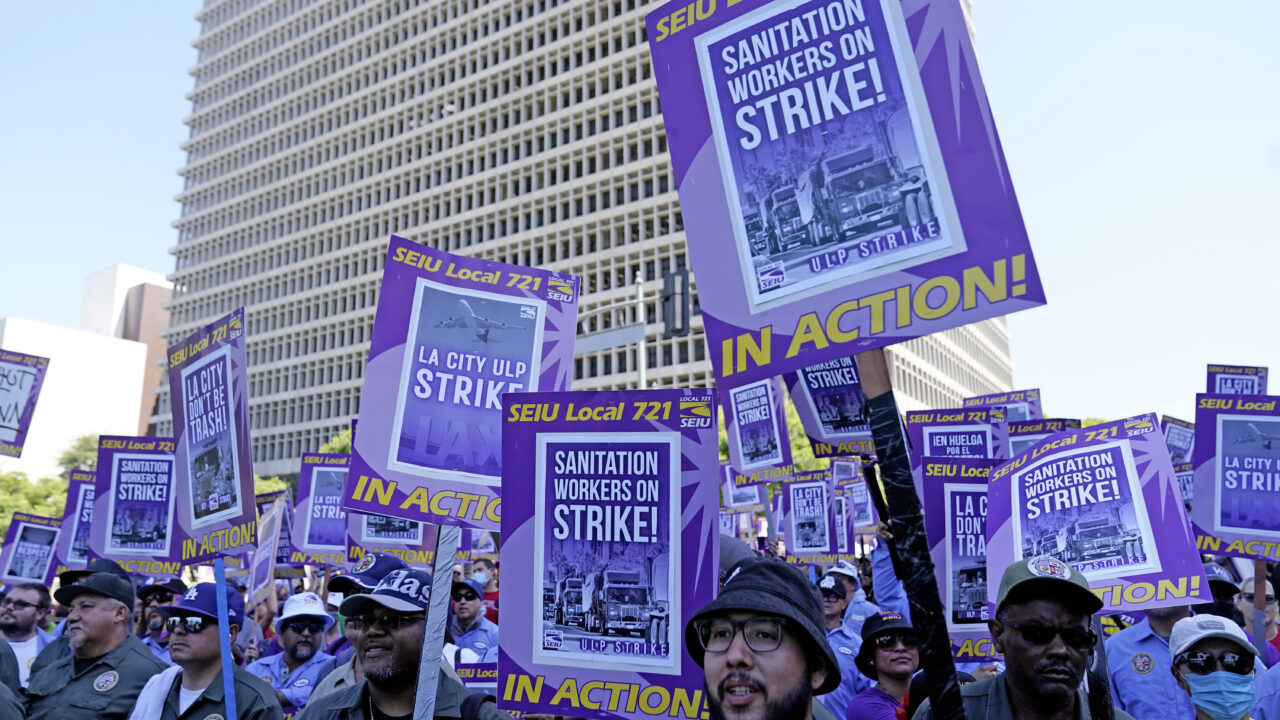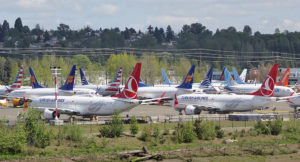Major Union Contract Battles on the Horizon in 2024
2023 set the bar high for the labor movement as the fight for workers' rights continues into the new year. Workers picket outside of City Hall Tuesday, Aug. 8, 2023, in Los Angeles. (AP Photo/Ryan Sun)
Workers picket outside of City Hall Tuesday, Aug. 8, 2023, in Los Angeles. (AP Photo/Ryan Sun)
Major contract fights in 2023 at UPS, the Big 3 automakers, and Hollywood studios set the tone for next year’s contract campaigns. Impressive gains and increased transparency got members of other unions asking, “Why can’t my union be like that?”
The bar will be high. Many of the contracts expiring next year date from before the pandemic, and before inflation started taking a bite out of paychecks. Some unions took concessions, like creating lower wage and benefit tiers, that members are ready to fight to undo this time around.
AT&T
Two contracts covering 25,000 AT&T wireline workers expire in 2024. One, covering 9,000 Communications Workers (CWA) members in California and Nevada, is up April 6; the other, covering 16,000 workers in nine Southeastern states from Florida to Kentucky, expires August 3. The union hopes to improve conditions for the second-tier workforce of installation technicians who earn lower wages and have worse work rules, such as mandatory weekend overtime.
AT&T workers in the Southeast struck for five days in 2019, their first time since a national strike in 1983. “When we bargained it, it was actually a good contract,” said Chris Walterson, president of CWA Local 3122 in Miami. But with inflation ballooning in the meantime, “we actually lost money because we did a five-year deal.” He said members will be looking to make up for what they lost in wages, and fighting AT&T’s ongoing efforts to make workers pay more health insurance costs.
A separate contract expires February 23 for 7,000 CWA members at AT&T Mobility (wireless) in the Southwest.
BOEING
The contract covering 30,000 Boeing Machinists (IAM) in Washington state expires September 12. Members are still fuming over the mid-contract concessions that Boeing demanded—and got—a decade ago by abruptly threatening to move production of its new plane, the 777X, elsewhere. In response, the IAM’s national leadership reopened bargaining—with no ability to strike—and agreed to give up the pension and allow a big shift in health care costs from the company to the workers.
“Boeing’s not really in any position right now to play games with us.”
Members voted that deal down the first time, but a revised version squeaked by with 51 percent on January 3, 2014, locking in the concessions for 10 years. (Many veteran union members were on holiday break and missed the vote.)
Furious members passed an amendment to the IAM constitution in 2016 requiring that the union conduct a vote of the local membership before engaging in any more mid-contract talks.
This time around, workers hope the tight labor market gives them the upper hand. The company is still recovering from the 737 MAX scandal when faulty design caused two deadly crashes. “Boeing’s not really in any position right now to play games with us,” said airframe mechanic and steward Patric Boone. “The 777X is so far behind, and they’ve got all these promises to deliver in 2024.”
One consultant told the Seattle Times the union could be seeking 40 percent wage increases over four years, “the market rate” in aviation following big wage increases for American, Delta, and United pilots. Machinists at Spirit Aerosystems, a key Boeing supplier in Wichita, Kansas, struck for six days in June and won a 31.5 percent increase over four years plus cost-of-living adjustments.
Many members want to restore the pension and end weekend mandatory overtime. The union is also seeking a commitment from Boeing to build its next jet locally.
Critically, the union will finally have the ability to strike again. District 751 even set up a special payroll deduction in 2019—five years before expiration—encouraging members to set aside $50 per paycheck in individual strike funds.
The union will hold a “prepare to strike” rally and strike authorization vote July 17 at the Seattle Mariners’ stadium.
(For a thorough overview, see the article by Dominic Gates in the Seattle Times, As Boeing Machinists contract talks near, union savors new labor power.”)
FLIGHT ATTENDANTS
American Airlines flight attendants are still negotiating; their contract expired in 2019. The 26,000 members of the Association of Professional Flight Attendants have seen no raises since before the pandemic. At the end of August they voted to strike by 99.47 percent.
Meanwhile 19,000 Southwest flight attendants, represented by Transport Workers (TWU) Local 556, voted down a December contract offer that included an immediate 20 percent wage increase. They’ve been negotiating for five years.
“Flight attendants are letting managements know that they are not going to take what management could have gotten away with in the past,” said APFA President Julie Hedrick. The union is demanding a 33 percent raise; American has offered 11.
United and Alaska flight attendants, members of the Association of Flight Attendants (CWA), are also in negotiations.
DAIMLER TRUCK
The master contract covering 7,000 Auto Workers members at Daimler Truck North America expires April 26.
The contract includes three North Carolina Freightliner plants where workers assemble and make parts for semis and medium-duty trucks. It also covers the largest school bus manufacturing site in North America: 1,700 workers at Thomas Built Buses in High Point, North Carolina.
North Carolina is in the midst of an industrial boom, with construction underway on Toyota’s flagship North American electric vehicle battery plant; an EV assembly and battery plant owned by Vietnamese carmaker VinFast that’s set to employ 7,000; a Boom Supersonic jet factory in Greensboro; and more.
School districts are ramping up their use of electric buses (an increasing focus of Thomas), encouraged by subsidies in the infrastructure bill. “The question for us is, what is the company going to do to retain labor and make it worthwhile for us to stay?” said one UAW member at Thomas.
Production workers there start between $18 and $21 an hour, with top pay $24-$27 ($29 for skilled trades). The Freightliner scale is slightly higher.
For Freightliner truck workers, another big issue is job security. Daimler Truck has two big assembly plants in Mexico, and has wrenched past concessions by threatening to move more work there. The UAW won the right to strike over plant closures at the Big 3 and over investment commitments at General Motors and Stellantis; could the union win similar or better language at Daimler Truck?
IATSE
The two main pattern-setting contracts covering 60,000 film and television crew workers expire on July 31.
Members of the Theatrical Stage Employees (IATSE) came close to striking in October 2021 over dangerously long hours and low pay. At the time, a majority voted against the union’s largest contract, the Hollywood Basic Agreement, but it passed thanks to an electoral-college-style ratification procedure.
Members frustrated with that outcome recently launched the Caucus of Rank-and-File Entertainment Workers (CREW), pushing for a stronger contract fight and one-member-one-vote union elections.
The writers and actors strikes put IATSE members out of work for four months in 2023, which could make it hard to strike—though the studios will also want to avoid another stoppage, giving the union leverage.
The contract covering thousands of TV and film musicians (AFM) expires in May.
EAST COAST LONGSHORE
The six-year master contract between the International Longshoremen’s Association and the alliance of ocean carriers and terminal operators (USMX), covering 17,000 East and Gulf Coast dockworkers, expires on September 30.
President Harold Daggett—one of the highest-paid union leaders in the U.S., pulling in $800,000 as head of the ILA and “president emeritus” of Local 1804-1—has vowed not to extend the contract past that date. He told members to prepare for a potential coastwide strike for big wage increases and to fend off automation. He’s also telling members they need to work faster to thwart automation, telling a meeting of local officers in November, “I need the bosses of this union to be bosses and stress to your locals that if you want a good contract, you have to get 32 moves per hour.” That’s the level Daggett said the union has promised USMX.
There has not been a strike on the East and Gulf coasts since 1977. Last year, West Coast longshore workers (ILWU) won 30 percent over six years plus a big bonus package. The ILA’s wage scale and pension payments are much lower than their West Coast counterparts’.
POSTAL
Two big contracts are up in 2024: the Postal Workers (APWU) agreement covering 220,000 postal clerks, maintenance workers, drivers, and retirees expires September 20, and the contract covering 100,000 Rural Letter Carriers (NRLCA) expires May 20.
New tech is an issue. APWU has won important job protections such as a no-layoff guarantee for anyone with six years’ seniority—they also cannot be forced to move more than 50 miles if their job is cut. But the Postal Service is pushing consolidation and automation, which could threaten jobs, even if it’s by attrition. “We’re facing a new generation of high-speed, highly capable parcel-sorting machines,” said Seattle APWU member David Yao.
For the rural letter carriers, a big issue is a new route evaluation system that cut pay for many. Rural carriers are salaried, not hourly, with their pay based on how long a route is supposed to take—often a bewildering underestimate. “It feels like you need a degree in engineering to figure out the numbers—it’s all these algorithms,” said Dave Staiger in Kalamazoo, Michigan. The hours have gotten longer as the job leans towards more packages, fewer letters.
The city Letter Carriers union (NALC) is still in negotiations, and the contract may be headed for arbitration. Acute understaffing and the low-paid entry-level tier are big issues.
Postal strikes are illegal, though it took 200,000 workers breaking that law in 1970 to win the right to collective bargaining.
GROCERY
A strike is “on the table more so than in the past” for 28,000 workers at Michigan grocery chain Meijer, says UFCW Local 951 President John Cakmakci. Their current deal expires February 24. Workers want wage increases, additional paid time off, and an affordable medical plan.
“I’ve been doing this as a full-time representative for almost 40 years,” Cakmakci told Crain’s. “It’s never been quite this optimistic for labor.”
ANHEUSER-BUSCH
The Teamsters’ five-year contract with Budweiser brewer Anheuser-Busch expires February 29. In negotiations so far, the union has already notched two big wins: forcing the company to restore retiree health benefits and end a two-tier health insurance system imposed during the last round of bargaining. The contract covers 5,000 Teamsters at 12 breweries.
TEACHERS
Two big teachers union contracts expire next year: Chicago (25,000 members) on June 30 and Philadelphia (13,000) on August 31. The Caucus of Working Educators, a reform group within the Philly union, is demanding paid parental leave and an end to punishing workers for using their earned sick time.
RETAIL JANITORS
The contract covering 700 janitors who clean Target, Best Buy, and other big stores in the Minneapolis-St. Paul area expires February 28. Workers are pushing for eight paid holidays (they currently get none) and more vacation time.
The janitors’ union, Service Employees Local 26, has lined up its other contracts to expire early next year as well, including ones covering 1,000 airport workers, 4,000 commercial office janitors, and 2,500 security guards. Several other Twin Cities locals are also working under expired deals or have agreements that will expire by the spring; among them are teachers and support staff in Minneapolis and St. Paul schools and Metro Transit bus drivers.
FIRST CONTRACT FIGHTS
In addition to all the expiring collective bargaining agreements, workers who have organized unions at companies including Starbucks, Amazon, Trader Joe’s, and Chipotle continue their fights for a first contract in the face of ongoing stalling and lawbreaking by their employers.
Your support matters…Independent journalism is under threat and overshadowed by heavily funded mainstream media.
You can help level the playing field. Become a member.
Your tax-deductible contribution keeps us digging beneath the headlines to give you thought-provoking, investigative reporting and analysis that unearths what's really happening- without compromise.
Give today to support our courageous, independent journalists.






You need to be a supporter to comment.
There are currently no responses to this article.
Be the first to respond.